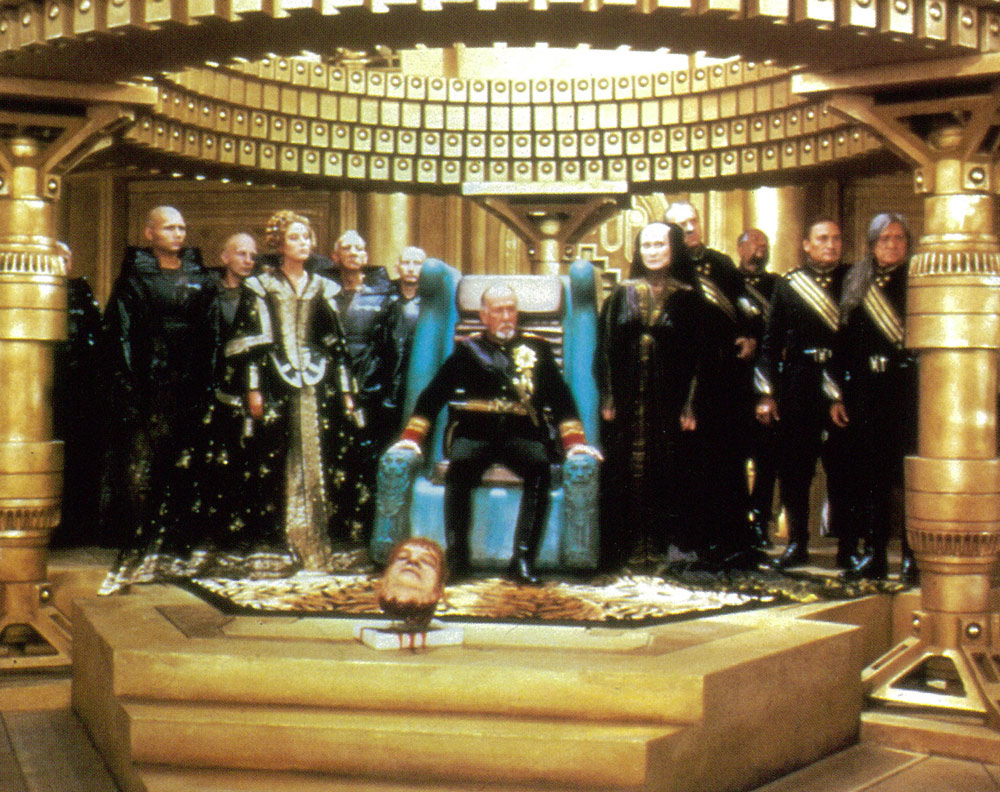
(C) 1984 DINO DE LAURENTIIS COMMUNICATIONS. ALL RIGHTS RESERVED.
David Lynch's one-of-a-kind science fiction at the mercy of the Dune studio
2020.03.05
“Dune” synopsis
The planet Arrakis is the only planet where the immortal drug Melange is produced, and the Emperor is plotting a conspiracy to gain control over it. The Space Guild's navigator senses this and visits the Emperor to question him. The Emperor was envious of Duke Leto Atreides, who had developed a weapon called the "Module" that amplified voices and destroyed matter, and after giving him Arrakis, he tried to provoke Baron Harkonnen, who was an enemy of the Duke, into his downfall. . However, the Navigator believes that the Duke's son, Paul Atreides, is a threat to them and orders his assassination. The Duke family descends on Arrakis and is attacked by an army arranged by Baron Harkonnen, and flees into the desert with his mother Jessica. The two join a group of Fremen, the natives of Arrakis, and give them modules to form a large army. Paul controls a giant sandworm and destroys Baron Harkonnen's army one after another. Paul eventually becomes a superhuman by drinking the "Water of Life" passed down by the Fremen, and challenges the Emperor to a final battle.
Index
- Visualization of a science fiction novel
- self-inflicted misfortune
- A passing point called failure
- A cult work of tenacity that incorporates the efforts of the staff.
Visualization of a science fiction novel
Frank Harvard's science fiction epic `` Dune: Sand Planet '' (published by Hayakawa Shobo) was once said to be impossible to visualize. Dino De Laurentiis, a famous producer in the Italian film industry, invited the genius David Lynch, who had received acclaim at the time for his work in `` The Elephant Man '' (1980), to make the book into a movie after many years of planning. .
``Dune'' (1984), Lynch's third full-length feature and first science fiction film, failed to recoup its $40 million production cost and ended up in the red. The evaluation was also not favorable. This film is a failure that even the director admits, but a lot of time, effort, and the director's spirit were invested in its production.

"Dune" (C) 1984 DINO DE LAURENTIIS COMMUNICATIONS. ALL RIGHTS RESERVED.
The original author, Harvard, serialized “Dune World” in an American analog magazine from 1963 to 1964. A year later, in 1965, he released a sequel, ``The Prophet of Dune,'' and combined these two works to create the first part of the series, ``Dune: The Sand Planet.'' The book, which depicts a feudal political system set on the sand planet "Arrakis," is said to be literally impossible to film due to its sheer scale and complexity, and many attempts have been made to film it. Each time, the project collapsed.
The first announcement that it would be made into a film was in 1971. Arthur P. Jacobs, the movie producer of `` Planet of the Apes '' (1968), has acquired the rights to film the original novel, and plans are about to move forward. However, due to his sudden death in 1973, during the early stages of planning, the project disappeared without ever seeing the light of day. A second Being There then came to Alejandro Jodorowsky, the master of El Topo (1970).
Jodorowsky was joined by sculptor H.R. Giger, who would later become famous for `` Alien '' (1979), and Dan O'Bannon, who also wrote the screenplay for ``Alien,'' who is world-renowned for his music. The cast includes extraordinary creators from various fields, including psych/prog rock band Pink Floyd, Orson Welles, the master of Citizen Kane (41), and Spanish surrealist artist Salvador Dali.
"Jodorowsky's DUNE" trailer
However, it is. Jodorowsky's vision was extremely large in scale, and in order to thoroughly reflect the intensity of the original novel, the film required a running time of 12 hours. The project's extraordinary scale was not able to begin filming due to financial constraints, and the project was abandoned. Please refer to the documentary `` Jodorowsky's DUNE '' (13) for the details of the incident.

